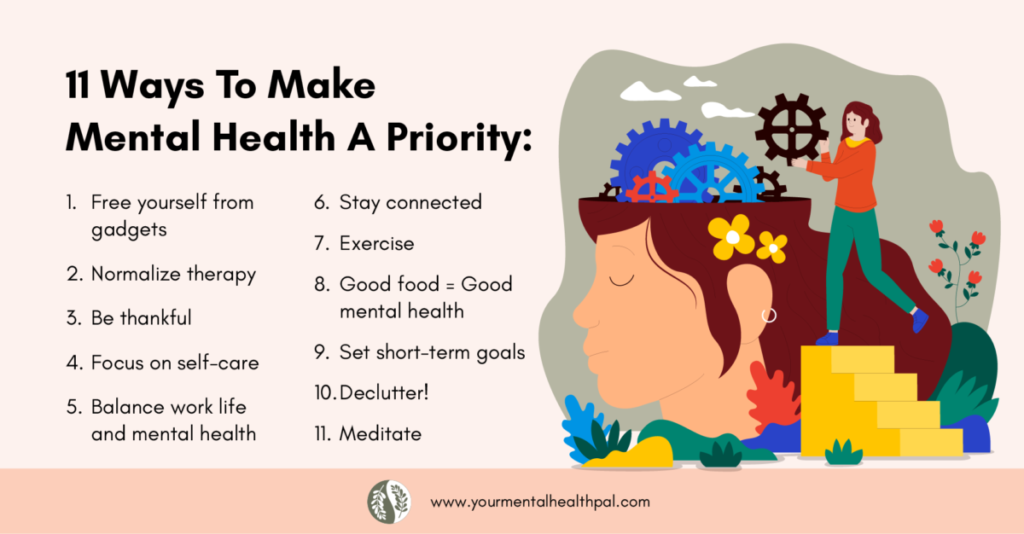According to an article by the University of Illinois, the number of mental health patients with any mental health disorder increased by 22% during the lockdown. The negligence of mental health and pandemic is what led to the national mental health crisis in 2020.
For good or bad reasons, the pandemic made us aware of our mental health priorities. It took us two years of confinement and the whole world to stop to realize our mental health needs attention.
But now that we have learned about what harm the negligence of mental health can do, let’s move on to the cure. This year, let’s make mental health our priority.

11 Priorities To Help Your Mental Health
To help you make that happen we have come up with the best ways to make your mental health a priority.
1. Free yourself from gadgets

Spending excessive amounts of time in front of a computer is not only terrible for our eyes and productivity, but it may also be harmful overall to our emotional well-being, says an article by Frontiers. Many of us use our phones just before going to sleep, and when we wake up, we often check the screen of our phones again. This highlights how dependent we are on our smartphones and other such devices.
Now that the lockdown has been lifted, we should schedule time each day to use our gadgets, and try to spend part of that time outside taking in some fresh air, talking to our loved ones, or engaging in activities we actually like.
2. Normalize therapy

We regularly talk to our friends and family when we are having problems, are depressed, or are going through a difficult period in life, but sometimes nothing seems to help. During such moments, you shouldn’t avoid getting psychological support. Visiting a psychiatrist is not always necessary when seeking psychological support, since there are many other specialists who may be extremely helpful. These professionals include behavioral scientists, life coaches, and a range of therapists.
If you don’t always feel comfortable talking to your practitioner, go for another until you find someone easier to connect with.
3. Be thankful

According to a study by Harvard, people who often show gratitude are generally happier and less prone to feeling stressed out on a daily basis. If you make a habit of expressing thankfulness for all the beautiful things in your life, you’ll remain more balanced. Expressing gratitude doesn’t mean that you shouldn’t be angry or frustrated when unfortunate things happen to you; rather, it means that you should take a moment to reflect on the situation wisely or perhaps to think back on a time when something wonderful happened to which you are extremely grateful.
4. Focus on self-care

Self-care is more than just pampering yourself with a spa day or a staycation at your favorite hotel. It is making everyday decisions with your mental health priorities in mind.
In order to practice self-care, one must follow:
- a good diet and exercise routine,
- get adequate rest and take breaks from work, and
- distance themselves from others which negatively impacts their mental and emotional well-being.
Think of it as a form of burnout protection for yourself. You need to be mentally sound and satisfied on the inside if you want to radiate happiness and good vibes to everyone around you. Recognize that taking care of yourself is not selfish.
5. Exercise

It has been demonstrated that regular exercise helps people’s mental health. According to a study by Harvard, exercise doesn’t have to involve hitting the gym five days a week; a 15-minute solo stroll in the great outdoors can help improve your mood and lower your stress levels. According to a news article by Mayo Clinic, the body produces more vitamin D if you engage in regular outdoor movements such as running or outdoor sports, and vitamin D helps to minimize the signs of sadness.
Read more: What Mental Health Needs Is More Sunlight
6. Balance work life and mental health

Whether it is working from home or in the office, unbalanced work life can cause poor mental health. According to a survey by Deloitte, 77% of 1,000 people who participated in a poll on work-life balance said they had at least once experienced burnout in their present occupations. Thus we need to create an appropriate balance between work and personal life. For that you need to :
- make a routine,
- set new goals for work and personal life,
- draw a line between the two, and
- finish the unfinished business.
Moreover, get to know the assistance option for mental health that your employer provides and how to take advantage of them. When one of your staff members is struggling with mental health concerns, they might not have the energy to slog through the system and sort it out on their own. By presenting a clear road map, you can induce them to seek the assistance they require.
7. Stay connected

Make time to call that buddy or relative you’ve been meaning to for a month. It is very important to surround yourself with or remain in touch with people that make you feel better about yourself in today’s world when the bulk of people sees each other as some kind of competition.
A study by the National Library of Medicine has demonstrated that interacting regularly with individuals who make you feel loved and wanted reduces stress and anxiety and raises self-esteem. In today’s technologically linked world, there are many methods to remain in touch with the people you care about and let them know you are thinking of them, like sending an SMS or posting a meme.
8. Good food = Good mental health

People typically eat excessively or insufficiently when anxious or sad. If you consume a diet that is well-balanced and has sufficient amounts of all the necessary nutrients, you will be able to think more clearly, be more alert, and make better judgments.
According to an article by the University of Michigan, sugar and processed meals are the primary causes of mood disorders including anxiety and sorrow. Your physical and mental health will benefit from making healthier food choices.
Read more: Is The Saying “Good Food Good Mood” Scientifically Correct?
9. Set short-term goals

Setting high goals can often be demotivating since your progress seems invisible to you at times. So instead, set small goals and go step by step on your journey to success. In this way, you can track your progress easily and feel motivated throughout the path to success.
And instead of calling it a break, celebrate achieving your small goals and reward yourself with something that you enjoy doing. This positive perspective will not only keep your mental health well but also make you even more productive than before.
10. Declutter!

Cleaning and organizing have a strong relationship to reducing stress and anxiety. You may feel more in charge of your life and take better care of your mental health by taking modest steps like keeping your kitchen clean and organized at all times, putting your belongings in their proper locations, and making plans for the next day. If your surroundings are congested, it will be difficult for you to concentrate on what is truly essential.
While organizing and decluttering, you can come across some of your most prized memories or long-lost artifacts, which will instantly lift your spirits. You could even come across something that relates to the interests you had to put on hold because of your busy schedule. This will inspire you to pick up your interests again and enhance your general well-being.
11. Meditate

Last but not least, make space for meditation in your schedule. The stress of daily life is inevitable but you can deal with it by meditating, for at least ten minutes a day. According to an article by Mayo Clinic, adding meditation to your routine gives several mental health benefits, such as:
- improved sleep,
- enhanced productivity,
- reduced anxiety levels,
- increased focus on the present,
- reduced negative emotions,
- increased imagination and creativity,
- increase in patience and tolerance,
- lowered resting heart rate, and
- lowered resting blood pressure.
Takeaway
Since we all lead busy lives, we somehow have a tendency to ignore our mental health priorities, however, it is of utmost importance and shouldn’t be neglected.
Given what we’ve all been through last year, including fear, irrationality, the unpredictability of the future, health issues, etc., we should focus more on taking care of ourselves. All of this had a significant influence on our mental health and going forward, we should concentrate on ways to enhance it so that we can handle anything that comes our way mentally. Develop good habits, take care of ourselves, call out for assistance, and work on ourselves! Cause we deserve it!
Stay connected through the comment box below and let us know which mental health priorities you would be implementing this year.
Let’s end the stigma together and make mental health our priority, and if stress stills overwhelms you, don’t hesitate to seek professional help. Now you can seek professional help online in the comfort of your very house. To know more about online therapy, click here.
Subscribe to Your Mental Health Pal to learn about mental health and self-care.

